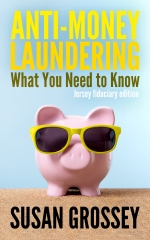With the recent headlines concerning Mr Trump’s tax arrangements and Mr Johnson’s awarding of government contracts to chums, you can imagine that the issue of morality has been much on my mind. I come from mixed stock: one half of my family was capitalist to the core while the other half spent most of their time on good works and community projects. No, my parents’ marriage did not last long. And now I find myself something of a moral mongrel: I make my living in the financial sector, but from telling them how to be law-abiding, altruistic citizens. But again and again I wonder how we can make AML (and other issues, of course, but everything else is way less interesting) something that people want to do rather than something they have to do.
In an article earlier this month in the Economist, columnist Bartleby made some helpful observations about cheating, fraud and other morally suspect behaviour within organisations:
- “Individuals are not very good at assessing the purity of their own motivations” – on the other hand, we are pretty expert at what are known in our household (thanks to an enduring obsession with the movie “The Big Chill”) as “juicy rationalisations”, whereby we are remarkably creative when presenting our own decisions and actions as morally defensible
- Within companies, “a culture of cheating can spread quickly” – or, as we like to say in the worlds of corporate governance and AML, it’s all about “tone from the top”
- “Individuals are more likely to lie, or commit fraud, when they are set excessively difficult and specific goals” – now, I have long railed against the bonus culture, where a proportion (sometimes a significant proportion) of people’s pay is based on performance. In the sales side of finance, this can (I believe) lead to people taking on business that they would otherwise reject, in order to “make the target”. Moreover, as Bartleby puts it so well in reporting the findings of a 2015 study by academics at Columbia and Harvard business schools, “under pressure, people do not efficiently analyse information that could otherwise keep them on the straight and narrow”.
Now I don’t often resort to capital letters to make a point but today I shall: we need to GIVE PEOPLE TIME AND SPACE TO BE ETHICAL. One tactic suggested by those academics would work well in the AML environment: if you signal clearly that ethical issues may arise, people are more likely to take them into account when making decisions. So perhaps a little reminder about your corporate ethics code of conduct at the top of your take-on/onboarding paperwork will pay dividends – apparently even just mentioning the word “ethics” has a positive effect. Ethics! (Has it worked?)





















Good luck with that Susan. The world is going the other way.
😢
Sometime ago now I used to work in anti-corruption work for a large Police force so I had a lot fo interest in this area. There is a lot of work in behavioural Economics on cheating, ethics and how to avoid malfeasance, you mention the importance of reminding people of their ethical codes (I suggested that if possible the police could introduce a daily ceremony where they recited their oath of office…this was not popular and I admit might be a bit cheesy…).
I think the issue with a lot of places, but especially Government and Finance is that the opposing corrupting culture is so strong that any attempt to move to a more ethical culture is squashed down quite quickly. The grass eaters (As we used to call it in Police corruption following the Knapp commission I think), ie those who do not actively seek out or are actively corrupt but passively accept inducement and do not report more active (meat eater) colleagues provide “cover”. it becomes the “water” the fish swims in and does not notice.
Ultimately the profit motive is not a good inducer to moral behaviour (as both early Victorians and even Adam Smith himself recognised). While HM Gov is in theory not for profit, it is infected with the notion that private for profit enterprise is always better than government for societal good, despite what is now (In my lifetime alone) decades of evidence that is not the case. While they believe that Government itself will find ethical behaviour difficult
Thank you for this excellent comment, Robert – depressing, but all too true. We need some of that early Victorian spirit back again: they were mad about self-improvement and the common good. I’m going to borrow your grass-eater/meat-eater image, as I think it’s an excellent explanation for the acquiescence of so many. (We could take it further: grass-eaters perhaps fear being eaten by the meat-eaters if they make a fuss and draw attention to themselves…)